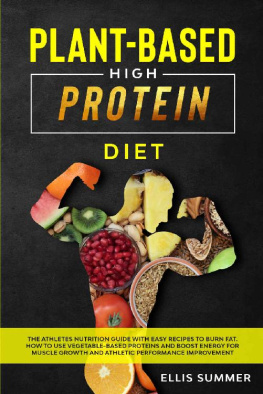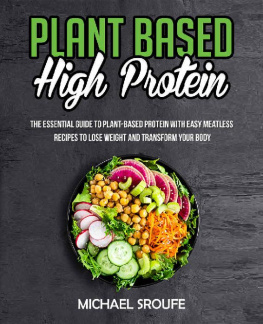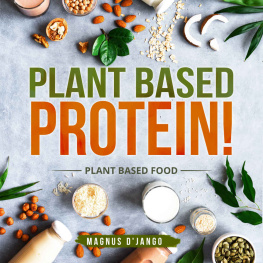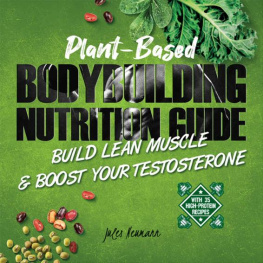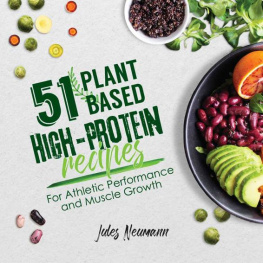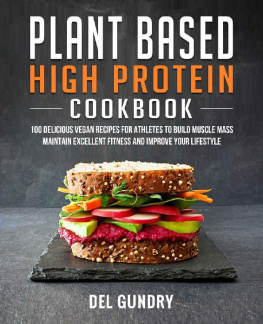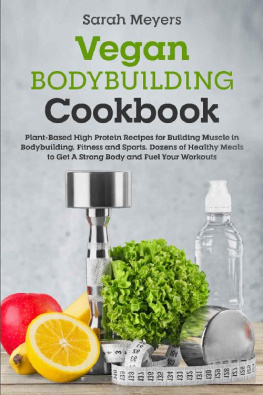PLANT-BASED HIGH-PROTEIN DIET The athletes nutrition guide with easy recipes to burn fat. How to use vegetable-based protein and boost energy for muscle growth and athletic performance improvement Ellis Summer Copyright 2020 - All rights reserved. The content contained within this book may not be reproduced, duplicated or transmitted without direct written permission from the author or the publisher. Under no circumstances will any blame or legal responsibility be held against the publisher, or author, for any damages, reparation, or monetary loss due to the information contained within this book. Either directly or indirectly. Legal Notice: This book is copyright protected.
This book is only for personal use. You cannot amend, distribute, sell, use, quote or paraphrase any part, or the content within this book, without the consent of the author or publisher. Disclaimer Notice: Please note the information contained within this document is for educational and entertainment purposes only. All effort has been executed to present accurate, up to date, and reliable, complete information. No warranties of any kind are declared or implied. Readers acknowledge that the author is not engaging in the rendering of legal, financial, medical or professional advice.
The content within this book has been derived from various sources. Please consult a licensed professional before attempting any techniques outlined in this book. By reading this document, the reader agrees that under no circumstances is the author responsible for any losses, direct or indirect, which are incurred as a result of the use of information contained within this document, including, but not limited to, errors, omissions, or inaccuracies.
Introduction
Plant-based or plant-forward eating patterns focus on foods primarily from plants. This includes not only fruits and vegetables, but also nuts, seeds, oils, whole grains, legumes, and beans. It doesnt mean that you are vegetarian or vegan and never eat meat or dairy.
Rather, you are proportionately choosing more of your foods from plant sources. Plant foods offer a wide range of advantages over animal foods. They are scientifically recommended for healthy living as they promote a persons wellbeing. By eating plant-based foods, a person is able to reduce the risk of certain illnesses and avoid problems associated with overweight/obesity. Plant foods are advantageous in their low fat and calorie load. They are also dense in their protein content.
Proteins are excellent in helping a person watch weight as they prevent the gaining of body fat. By consuming plant proteins, a person produces more weight limiting hormones. Proteins also help in weight reduction by reducing the feelings of hunger while at the same time increasing the metabolic rate of the body. By consuming plant products, a person reduces the risk of being overweight. Plants offer excellent sources of fiber, antioxidants, minerals, and vitamins. Plant foods are mainly high in fiber which is helpful in digestion as it limits the amount of sugars absorbed in the digestion process.
The fiber in plant foods is also helpful in reducing cholesterol by preventing the absorption of fats in the foods we take. Fiber also helps in preventing constipation in enhancing the digestion of foods. It helps in the stimulation of the various digestive organs to produce important digestive juices. Enough intake of dietary fiber prolongs the amount of time food takes to move through the canal, increasing the absorption of minerals and vitamins in the food. It also prevents diarrhea and excessive hardening of stool. Research has also confirmed that people who take foods high in fiber are at a lower risk of gaining weight.
By consuming foods high in fiber, a person reduces the chances of developing type 2 diabetes. The reason behind the fiber preventing the occurrence of type 2 diabetes is the ability of the fiber to reduce the amounts of sugar the body absorbs maintaining a healthy blood sugar level. It is also attributed to lowered cholesterol and reduced risk of developing heart disease. The fiber in the digestive system also clumps fats reducing the rate at which they are digested and absorbed in the body. Healthy bacteria in the gut thrive on soluble fiber. The bacteria microbiome feeds on the remains of fermented fiber in the digestive system.
These bacteria help in the production of short-chain fatty-acids that help in reducing cholesterol in the body. The short chain fatty-acids also promote good health by reducing inflammation in the body. Inflammation is a risky condition linked to the development of serious illnesses such as cancer among others. Plant foods reduce the risk of cancers, such as colorectal cancer. While animal foods are found to increase the risk of cancer, plants contain phytochemicals and antioxidants that reduce the risk of developing cancer while at the same time fighting the progress of cancer cells. The fiber found in plant foods is also helpful in detoxification of the body.
The detoxification process is aided by both soluble and insoluble fiber. The soluble fiber absorbs the excess hormones and toxins within the body, preventing them from being taken up by the cells. Insoluble fiber works by preventing the absorptions of toxins fond in the foods we consume from the digestive track. It also increases the time which food takes to go through the digestive track. The process is said to reduce the body's demands for more food.
Chapter 1.
Chapter 1.
Plant-Based Diet
What is plant-based diet? There is no clear definition of what strictly a plant-based diet is all about. As the name implies, the plant-based diet emphasizes consuming only plant products such as vegetables, fruits, whole grain, seeds, nuts, and legumes. While the definition is simple enough, there are some variations of the plant-based diet and some variations exclude the consumption of refined food items like sugar, white flour, and processed oils. Another variation of the plant-based food is the exclusion of any kinds of oil or only consuming organic whole food plant-based ingredients. The thing is that whatever variation of the plant-based diet you adopt, you will be able to enjoy its many benefits. (How much you require relies on your age, sex, task and weight.) Plant healthy protein can be an excellent choice in contrast to healthy animal protein. (How much you require relies on your age, sex, task and weight.) Plant healthy protein can be an excellent choice in contrast to healthy animal protein.
Below there are a couple of reasons that explain that. Plant proteins are full, healthy proteins There's a preferred false impression that healthy plant protein is substandard to healthy animal protein, yet, that's not the case. You do not need to consume meat to obtain ample quantities of healthy protein. Healthy animal protein usually has more healthy protein per offering than vegetables. It is commonly thought to be a total healthy protein because it includes all the 9 necessary amino acids that our bodies cannot make by itself. Since we require to obtain them from our diet plan; our body produces the others that we need.
These amino acids are called crucial. Numerous plant foods do not include all the 9 vital amino acids and are occasionally described as insufficient healthy protein. Amino acids are the structure blocks of healthy protein, and in general, we require sufficient quantities for the body to operate. As long as we consume a range of foods over our days that jointly have all of the vital amino acids, the body has the raw product it requires to make healthy proteins. That stated some plant foods are taken into consideration full, healthy proteins - spirulina, chia seeds and maca powder, among others. Plant Healthy Protein Is A Lot More Lasting When picking what to place in our mouths, we should take notice that environmental changes and the decreasing of all-natural sources make it much more essential than ever before to be careful of the wellness of the earth.

